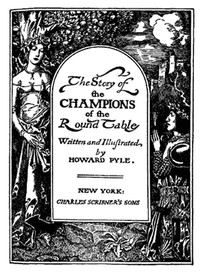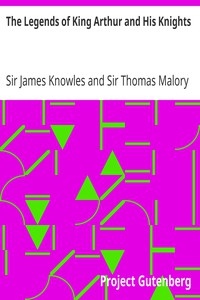The Story of the Champions of the Round Table, Howard Pyle [the beginning after the end read novel .TXT] 📗

- Author: Howard Pyle
Book online «The Story of the Champions of the Round Table, Howard Pyle [the beginning after the end read novel .TXT] 📗». Author Howard Pyle
These, when Sir Launcelot came nigh, began to call to him on high, crying: "Turn back, Sir Knight! Turn back! Else you will meet your death at this place."
But Sir Launcelot would not turn back, but advanced very steadfastly upon his way.
Now somewhat nigh the farther end of that bridge there stood a little lodge of stone, built to shelter the warden of the bridge from stress of weather. When Sir Launcelot came nigh to this lodge there started suddenly out from it a great churl, above seven feet high, who bore in his hand a huge club, shod with iron and with great spikes of iron at the top. This churl ran to Sir Launcelot and catched his horse by the bridle-rein and thrust it back upon its haunches, crying out in a great hoarse voice: "Whither goest thou, Sir Knight, for to cross this bridge?" Sir Launcelot said: "Let go my horse's rein, Sir Churl." Whereunto the churl made answer: "I will not let go thy horse's rein, and thou shalt not cross this bridge."
At this Sir Launcelot waxed very angry, and he drew his sword and struck the churl a blow with the flat thereof upon the shoulder, so that he dropped the rein very quickly. Therewith that churl drew back and took his great iron-shod club in both hands and struck at Sir Launcelot a blow that would have split a millstone. But Sir Launcelot put by the blow with his sword so that it did him no harm. But therewith he waxed so wroth that he ground his teeth together with anger, and, rising in his stirrups, he lashed that churl so woeful a blow that he cleft through his iron cap and his head and his breast even to the paps.
Now when the people of the town beheld that terrible blow they lifted up their voices in a great outcry, crying out: "Turn back, Sir Knight! Turn back! For this is a very woful thing for thee that thou hast done!" and some cried out: "Thou hast killed the giants' warder of the bridge!" And others cried: "Thou art a dead man unless thou make haste away from this." But to all this Sir Launcelot paid no heed, but wiped his sword and thrust it back into its sheath. Then he went forward upon his way across the bridge as though nothing had befallen, and so came to the farther side. Then, without paying any heed to all the people who were there, he rode straight to the castle and into the gate of the castle and into the court-yard thereof.
Now by this time all the castle was astir, and in great tumult, and many people came running to the windows and looked down upon Sir Launcelot. And Sir Launcelot sat his horse and looked all about him. So he perceived that beyond the court-yard was a fair space of grass, very smooth and green, well fitted for battle, wherefore he dismounted from his horse and tied it to a ring in the wall, and then he went to that green field and made him ready for whatever might befall.
Meantime all those people who were at the windows of the castle cried out to him, as the people of the town had done: "Go away, Sir Knight! Go away whilst there is still time for you to escape, or else you are a dead man!"
But Sir Launcelot replied not, but stood there and waited very steadfastly. Then the great door of the castle hall opened, and there came forth therefrom those two giants of whom he had heard tell.
And in truth Sir Launcelot had never beheld such horrible beings as they; for they were above ten feet high, and very huge of body and long of limb. And they were clad in armor of bull-hide with iron rings upon it, and each was armed with a great club, huge and thick, and shod with iron, and studded with spikes. These came toward Sir Launcelot swinging their clubs and laughing very hideously and gnashing their long white teeth, for they thought to make easy work of him.
Then Sir Launcelot, seeing them coming thus, set his shield before him, and made ready for that assault with great calmness of demeanor. Then the giants rushed suddenly upon him and struck at him, the both of them together; for they deemed that by so doing the enemy could not escape both blows, but if one failed the other would slay him. But Sir Launcelot put aside the blow of one giant with his sword and of the other with his shield, with marvellous dexterity. Thereupon, ere they could recover themselves, he turned upon that giant who was upon his left hand and he struck him so terrible a blow upon the shoulder that he cut through the armor and through the shoulder and half-way through the body, so that the head and one arm of the giant leaned toward one way, and the other arm and the shoulder leaned toward the other way. Therewith the giant fell down upon the ground bellowing, so that it was most terrible to hear; and in a little he had died where he had fallen.
Now when the fellow of that giant beheld that dreadful, horrible stroke, he was so possessed with terror that he stood for a while trembling and like one in a maze. But when he saw Sir Launcelot turn upon him with intent to make at him also, he let fall his club and ran away with great and fearful outcry. Therewith he ran toward the castle and would have entered therein, but those within the castle had closed the doors and the gates against him, so that he could not escape in that way. So the giant ran around and around the court with great outcry, seeking for some escape from his pursuer, and Sir Launcelot ran after him. And Sir Launcelot struck him several times with his sword, so that at last, what with terror and pain and weariness, that giant stumbled and fell upon the ground. Therewith Sir Launcelot ran at him, and, ere he could rise, he took his sword in both hands and smote off his head so that it rolled down upon the ground like a ball. Then Sir Launcelot stood there panting for breath, for he had raced very hard after the giant, and could hardly catch his breath again. As he stood so, many of those of the castle and many of those who were of the town came to him from all sides; and they crowded around him and gave him great acclaim for ridding that place of those giants.
Then Sir Launcelot said to them: "Where is your lord?" Whereunto they made reply: "Sir, he lieth in the dungeon of the castle under the ground chained to the walls thereof, and there he hath been for three years or more, and no one hath dared to bring him succor until you came hither." "Go find him," said Sir Launcelot, "and set him free, and lose no time in doing so. And put him at all ease that you can."
They say: "Will you not stay and see him, Messire, and receive his acknowledgements for what you have done?" But Sir Launcelot replied: "Nay, not so." Then they say: "Will you not have some refreshment after this battle?" Whereunto Sir Launcelot said: "I do not need such refreshment." Then they say: "But will you not rest a little?" "Nay," said Sir Launcelot: "I may not tarry, for I have far to go and several things to do, so that I do not care to stay." So he loosed his horse from the ring in the wall, and mounted upon it and rode away from that castle and from that town and across the bridge whence he had come. And all the people followed after him, giving him great acclaim.
So Sir Launcelot left the castle, not because he needed no rest, but because he could not endure to receive the thanks of those whom he benefited. For though he loved to bring aid to the needy, yet he did not love to receive their thanks and their praise. Wherefore, having freed the lord of that castle from that brood of giants, he was content therewith and went his way without resting or waiting for thanks.
For so it was with those noble gallant knights of those days; that whilst they would perform signal service for mankind, yet they were not pleased to receive thanks or reward for the same, but took the utmost satisfaction, not in what they gained by their acts, but in the doing of knightly deeds, for they found all their reward in their deeds, because that thereby they made the world in which they lived better; and because they made the glory of the King, whose servants they were, the more glorious.
And I hold that such behavior upon the part of anyone makes him the peer of Sir Launcelot or Sir Tristram or Sir Lamorack or Sir Percival; yea, of Sir Galahad himself. For it does not need either the accolade or the bath to cause a man to be a true knight of God's making; nor does it need that a mortal King should lay sword upon shoulder to constitute a man the fellow of such knightly company as that whose history I am herewith writing; it needs only that he should prove himself at all times worthy in the performance of his duty, and that he shall not consider the hope of reward, or of praise of others in the performance of that duty.
So look to it that in all your services you take example of the noble Sir Launcelot of the Lake, and that you do your uttermost with might and main, and that you therewith rest content with having done your best, maugre any praise. So you shall become a worthy fellow of Sir Launcelot and of his fellows.


Chapter Eighth
One day Sir Launcelot came at early nightfall to a goodly manor-house and there he besought lodging for the night, and lodging was granted to him very willingly.
Now there was no lord of that manor, but only an old gentlewoman





Comments (0)